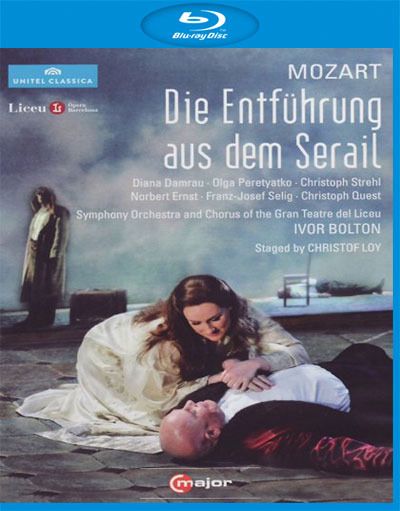12:00
Mozart - Die Entführung aus dem Serail (Ivor Bolton, Diana Damrau) (2011) [BluRay-rip]
Posted by kwakee
Mozart: Die Entfuhrung Aus Dem Serail / Bolton, Damrau, Peretyatko, Strehl [Blu-ray]
Conductor: Ivor Bolton | Composer(s): Wolfgang Amadeus Mozart | Performer(s): Franz-Josef Selig, Diana Damrau, Christoph Strehl, Olga Peretyatko | Orchestra/Ensemble: Barcelona Teatro Liceu Orchestra, Barcelona Teatro Liceu Chorus | Label: C Major | BluRay-rip | AVC | MKV 1920x1080 (16:9) / 6215 kbps / 29,970 fps | Audio: DTS / 6ch / 48.0 KHz / 24 bits | File hosts: Share-online.biz, Uploaded.net | 5% recovery record + 1 .rev file | Run time: 188 mins | 10.7 GB
Language(s): German | Subtitle(s): German, English, French, Spanish, Catalan, Chinese, Korean
Recorded live at the Grand Teatre del Liceu, Barcelona, 2011
Conductor: Ivor Bolton | Composer(s): Wolfgang Amadeus Mozart | Performer(s): Franz-Josef Selig, Diana Damrau, Christoph Strehl, Olga Peretyatko | Orchestra/Ensemble: Barcelona Teatro Liceu Orchestra, Barcelona Teatro Liceu Chorus | Label: C Major | BluRay-rip | AVC | MKV 1920x1080 (16:9) / 6215 kbps / 29,970 fps | Audio: DTS / 6ch / 48.0 KHz / 24 bits | File hosts: Share-online.biz, Uploaded.net | 5% recovery record + 1 .rev file | Run time: 188 mins | 10.7 GB
Language(s): German | Subtitle(s): German, English, French, Spanish, Catalan, Chinese, Korean
Recorded live at the Grand Teatre del Liceu, Barcelona, 2011

Barcelona’s prestigious Gran Teatre del Liceu presents Mozart’s beloved singspiel in an elegant, dramaturgically twisted production with a sparkling cast of top-rank international stars headed by coloratura soprano Diana Damrau as Konstanze and rising opera star Olga Peretyatko as Blonde. German soprano Diana Damrau achieved a huge success and was hailed by critics as a thrilling Konstanze. Christoph Strehl, a tall and aristocratic tenor of important means and burnished technique, made Belmonte’s difficult music sound easy. Franz Josef Selig was celebrated by critics as one the best Osmins that had ever performed in that role. Christoph Loy has conjured up a thought-provoking and strikingly original scenario in which both Konstanze and Blonde are feeling respect, admiration and even profound love for their captors. The result is a tantalising approach that overturns the traditional patterns of good and evil.
Watch a Trailer (sample is a lower resolution than actual DVD or Blu-ray):
CAST:
Selim – Christoph Quest
Konstanze – Diana Damrau
Blonde – Olga Peretyatko
Belmonte – Christoph Strehl
Pedrillo – Norbert Ernst
Osmin – Franz-Josef Selig
Liceu Grand Theatre Chorus and Orchestra
Ivor Bolton, conductor
Christof Loy, stage director
Herbert Murauer, set and costume designer
Olaf Winter, lighting designer
REVIEW:Works on This Recording
Robert J Farr, MusicWeb International
After some years of relative neglect, perhaps out of mistaken political correctness and the impact of Muslim fundamentalism, this work has returned to favour. It is defined as a singspiel, a work of musical numbers interspersed with spoken dialogue. Perhaps to get away from the traditional and any sensitivities, this renaissance has led to some rather quirky productions. One was set on The Orient Express; yes, a train for a harem: any gimmick is possible for some directors and designers. I could not imagine how it could work and it didn’t. Similarly, Opera North treated the work as slapstick . I have to go back to the early 1980s when Glyndebourne produced elegant sets by William Dudley alongside a touring cast that brought the best out of Mozart’s creation whilst not shirking the coloured harem guard, Osmin, complete with curled toe shoes and fez. That production and elegant sets were caught on film at the main Glyndebourne Festival and is available on DVD (Arthaus 101 091). More recently I found much to commend in a production from Florence in 2002 by Eike Gramss with sets by Christoph Wagenknech and costumes by Catherine Voeffray. Christof Loy, the producer here, is renowned for his off-eat takes on opera, often with minimal sets and updated costumes. Examples are seen in his staging of Handel’s oratorio Theodora and Verdi’s Les Vê pres Siciliennes, the latter, with much gratuitous violence and incidents that the composer would not recognize. Minimal sets and updating to modern dress are to be found here as in those productions. In this production the set in act one is simply a chair and table on which the Harem guard, Osmin, stretches his legs. Complete with braces and tattooed arm he looks and behaves like a thug. The later acts are equally bereft of much in the way of stage sets although in act two there is a latticed backdrop to represent the entrance to the harem.
Despite the lack of much in the way of sets and effects, a production can work if the participants have the stage persona and acting ability to bring it off. At least one of the participants here has just that and then some. If it happens to be the actor taking the spoken role of Bassa Selim; well so be it. His acting, in facial expression, body language and spoken expression is outstanding and holds the whole together. He perhaps looks a little on the old side for Konstanze to feel emotion, and even sexual attraction, for him. But that is how Loy and Christoph Quest play it, and with the actor’s skill, bring it off. His sheer charisma, in comparison with the wimp that the tall Belmonte of Christoph Strehl conveys, would certainly turn any women with guts his way whatever the age difference. As a gimmick Belmonte enters via the orchestra pit carrying his suitcase and looking very foppish in a blazer (CH.3). His husky tenor, with an edge where the mellifluous should be, is effortful and not particularly appealing (CHs. 3, 8, 33, 39). Diana Damrau sings his inamorata, who he has come to rescue from the clutches of Selim. She shows some distinction in her first attempt at a role demanding considerable vocal flexibility and extended scale. Her singing has a pleasing tone and good expression. Her coloratura and decoration in Ach, ich sagt’ es wohl in act one (CH.12) is a pleasure to hear. Likewise her Traurigkeit (CH.23) warms her voice nicely for the formidable demands of Marten aller Arten (CH.25) in act two. She snatches at one note, but her formidable technique in this vocal stratosphere is commendable and not merely for its technical accomplishment. She conveys meaning in the words and in her acting.
Equally convincing as an actress, and looking very slim and comely in her tight skirt and high heels, is Olga Peretyatko as Blonde, Konstanze’s maid Osmin has set his licentious sights on her. Her singing is secure, characterful and pleasingly phrased (CHs. 18 and 27). She also plays an important part in the ensembles. As her suitor Pedrillo, Norbert Ernst is rather bland as singer and actor. His Turkish-type headgear is the only manifestation of ‘The Orient’ to be seen. As the Harem guard, Osmin, Franz-Josef Selig is vocally sonorous and acts the part well, albeit relishing his thuggish portrayal a little too much for my liking. His Oh, wie will ich triumphieren (CH.43) in act three, as Osmin thwarts the escape plan on recovering from being induced to drink alcohol containing a sleeping drug, is a highlight (CH.43). His earlier agonising, as a Muslim, about partaking of alcohol is also well conveyed by the singer.
At the end, somewhat in the manner of some productions of Cosi Fan Tutte, the participants are left with many doubts and stand about uncertain after Selim’s act of magnanimity. Ivor Bolton keeps the whole performance under admirably paced control with a firm but flexible baton and needle-sharp articulation. His contribution brings out the Turkish patina that one expects in Mozart’s creation and which the composer was intent on providing. He was doubtless influenced by an interest in all things Turkish – a fashion that was prevalent in Austria and Prussia at the time. He had previously written most of another singspiel around a Turkish subject, but failing to find a theatre to produce it left the work incomplete; it came to be called Zaide. Whilst frustrated by the failure to get his work staged he composed the opera seria Idomeneo. This was a significant success. Meanwhile, Gottlieb Stephanie, Stage Director at the Burgtheater, the Court Theatre set up by Emperor Joseph II in an attempt to promote singspiel, had been impressed with what he had seen of Zaide. He had promised Mozart a new libretto that would be even more congenial to him whilst also being on a Turkish theme. This was Die Entführung aus dem Serail. Mozart was greatly taken by the libretto and composed with enthusiasm. In this case Mozart does not eschew formal musical structures in pursuit of simplicity. He does not hesitate to include elaborate arias and complex textures in the orchestra. Die Entführung aus dem Serail was premiered on 16 July 1782 and it became his first truly outstanding operatic success. Its music is full of invention and vitality as well as having particular vocal challenges for the heroine. Mozart’s concern for the Turkish theme underlies the whole work and is also reflected in the many additions he made to the original libretto.
Die Entführung aus dem Serail, K 384 by Wolfgang Amadeus Mozart
Performer: Franz-Josef Selig (Bass), Diana Damrau (Soprano), Christoph Strehl (Tenor), Olga Peretyatko (Soprano), Norbert Ernst (Tenor)
Conductor: Ivor Bolton
Orchestra/Ensemble: Barcelona Teatro Liceu Orchestra, Barcelona Teatro Liceu Chorus
Period: Classical
Written: 1782; Vienna, Austria



0 comments:
Post a Comment